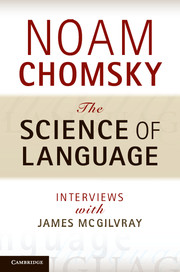Book contents
- Frontmatter
- Contents
- Introduction
- Part I The science of language and mind
- Part II Human nature and its study
- 15 Chomsky on human nature and human understanding
- 16 Human nature and evolution: thoughts on sociobiology and evolutionary psychology
- 17 Human nature again
- 18 Morality and universalization
- 19 Optimism and grounds for it
- 20 Language, agency, common sense, and science
- 21 Philosophers and their roles
- 22 Biophysical limitations on understanding
- 23 Epistemology and biological limits
- 24 Studies of mind and behavior and their limitations
- 25 Linguistics and politics
- Appendices
- Commentaries
- Glossary
- Bibliography
- Index
21 - Philosophers and their roles
from Part II - Human nature and its study
Published online by Cambridge University Press: 05 June 2012
- Frontmatter
- Contents
- Introduction
- Part I The science of language and mind
- Part II Human nature and its study
- 15 Chomsky on human nature and human understanding
- 16 Human nature and evolution: thoughts on sociobiology and evolutionary psychology
- 17 Human nature again
- 18 Morality and universalization
- 19 Optimism and grounds for it
- 20 Language, agency, common sense, and science
- 21 Philosophers and their roles
- 22 Biophysical limitations on understanding
- 23 Epistemology and biological limits
- 24 Studies of mind and behavior and their limitations
- 25 Linguistics and politics
- Appendices
- Commentaries
- Glossary
- Bibliography
- Index
Summary
JM: I'd like to better understand your view of what might – this is a question that is partly driven by what a graduate student asked me to ask you – of what you think a philosopher could plausibly contribute now. It seems that some philosophers – philosophers after Descartes's and Hume's time – have been behind the times. They have not fully comprehended how advanced the sciences [and in particular, linguistics] are . . .
NC: There are some philosophers who know the sciences very well, and who have contributed to [the sciences]. They don't question the sciences; they try to clarify what they are doing and even contribute to them at some conceptual level. That's pretty much what Descartes and Kant and others did who were called philosophers. You can be connected to the sciences and know them extremely well. Take someone like Jim Higginbotham. He knows linguistics very well, and contributes to it.
JM: Indeed . . .
NC: and is doing it not the way technical linguists do, but with philosophical interests that relate to traditional questions of philosophy, and so on. I think that that's always a possibility. I suspect that John Austin was right when he said that philosophy should be the mother of the sciences. It's clearing away the thickets and the underbrush and trying to set things up in such a way that the sciences can take over.
JM: So the job of philosophers is to beat around in the bushes and see if they can scare up any birds . . .?
NC: Not only in the sciences, but in people's lives. . . . Take for example [John] Rawls[, the political philosopher]. He's not working in the sciences. He's trying to figure out what concepts of justice we have that underlie our moral systems, and so on. And it does verge on the sciences. So when John Mikhail [who has a degree in philosophy but is also developing a science of a moral faculty that distinguishes permissible from impermissible actions] picks it up, it becomes a science.
- Type
- Chapter
- Information
- The Science of LanguageInterviews with James McGilvray, pp. 129 - 131Publisher: Cambridge University PressPrint publication year: 2012



